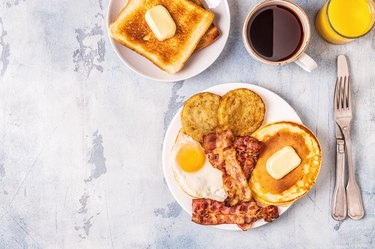
Cutting back on your oil and butter consumption can seem like a challenge, but it's doable with some creativity and compromise. Cooking eggs without oil or butter requires a little bit of both. Here are some recipe suggestions that can help.
Read more: 9 Things You May Not Know About Eggs
Video of the Day
Video of the Day
Cooking Eggs Without Oil
Eggs are a good source of protein; according to the USDA, a medium-sized egg offers 69.9 calories, 5.99 grams of protein, 4.46 grams of fat and 0.97 grams of carbs. A March 2019 study published in the journal Nutrients notes that eggs also contain micronutrients like calcium, phosphorus, potassium, sodium and vitamins A, B1, B2, B3, B5, B6, B8, B9, B12, D, E and K.
Cutting down on your oil and butter consumption doesn't have to mean that you miss out on eating eggs. Fortunately, they're a very versatile ingredient, and there are several ways to cook them. In fact, many methods of preparing eggs don't require oil or butter at all, so cooking eggs without oil or butter is not as difficult as it sounds. With a few slight adjustments, you should be just fine.
For instance, instead of trying to make omelettes without oil, you could opt for boiled, deviled or poached eggs. Boiled eggs can be eaten plain, chopped up and added to salads, or sliced up and layered into sandwiches.
Similarly, if you're trying to make scrambled eggs without butter, you could try a more creative approach where you scramble the eggs and add them to a simmering liquid instead of frying them, sort of how you would with egg drop soup.
Read more: 7 Reasons to Crack an Egg for Breakfast
Egg Recipe Suggestions
Here are a few recipe ideas that don't require oil or butter.
- Hard-boiled eggs: The American Egg Board (AEB) suggests putting the eggs in a pan, filling it with water until the eggs are submerged and heating the water over high heat until it boils. Then, take the pan off the heat and cover it for about 12 minutes. Take the eggs out of the hot water and place them in a bath of ice-cold water until they've cooled.
- Poached eggs: The AEB also lists a recipe for poached eggs. Fill a pan with 2 to 3 inches of water, broth, wine, milk, tomato juice or any other liquid and bring it to a boil. Turn the heat down to a simmer. Break fresh, cold eggs into a saucer and gently slip them into the liquid, one at a time. Cook them without stirring until the whites are done and the yolks begin to thicken slightly. Use a slotted spoon to lift them out and drain away the excess liquid.
- Deviled eggs: LIVESTRONG.com recommends a healthier take on the traditional deviled egg recipe. Make a stuffing mixture with 1 tablespoon of low-fat Greek yogurt, 1 teaspoon of fresh chives and some lemon juice. Slice a hard-boiled egg in half and remove the yolk. Stuff the yolk cavity with the yogurt mixture and sprinkle a dash of paprika on top.
- Avocado and egg salad: LIVESTRONG.com also lists a healthier version of the original egg salad recipe. Mash half an avocado and add in white wine vinegar, Dijon mustard and salt to make a creamy dressing. Hard-boil six eggs, remove the yolks and cut the egg whites into cubes. Dice the other half of the avocado and add it to the eggs, along with the dressing and a half-cup of chopped onions.
- Simmered scrambled eggs: Whisk eggs until they are scrambled. Pour them into any soup, gravy or risotto that's simmering on the stove to give it a rich and creamy consistency.
Read more: The Egg Diet Results